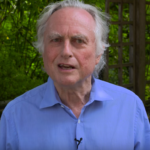How Do Atheists Define Love?
by Dr. Taylor Marshall
Filed under Anthropology
All my atheist friends and family members believe in “love.” But what is love? Here’s a question:
If humans have no soul, and are merely evolutionary advanced animals, is ‘love’ anything more than instinct or hormones?
In a letter to his ten-year-old daughter, atheist Richard Dawkins explained the importance of evidence in science and in life:
"People sometimes say that you must believe in feelings deep inside, otherwise you’d never be confident of things like ‘My wife loves me’. But this is a bad argument. There can be plenty of evidence that somebody loves you. All through the day when you are with somebody who loves you, you see and hear lots of little tidbits of evidence, and they all add up. It isn’t purely inside feeling, like the feeling that priests call revelation. There are outside things to back up the inside feeling: looks in the eye, tender notes in the voice, little favors and kindnesses; this is all real evidence."
What he is saying sure does sound like what “priests” talk about. But if love is not exclusively religious, then what is it? Let's explore the two most basic forms of love: love of a parent for a child and the nuptial love between husband and wife.
When mommy says to her one year old, “I love you,” the atheist says she is not expressing anything metaphysical or spiritual. In fact, says the atheist, the mother is verbalizing the instinct to preserve her species, just as a mommy zebra protects and fosters the growth of the baby zebra. That’s it. Nothing more. It is instinct combined with verbal tags. When a parent “loves” her child, she is just adding a verbal cue to an advanced evolutionary instinct to carry on the species.
The same empirical reality is true between two lovers. For the atheist, nothing sacramental, metaphysical, or spiritual is happening in a loving relationship. The two don’t “become one flesh” as we say in Biblical and matrimonial language any more than a rooster and a hen “become one flesh.”
When a man says, “I love you,” to his wife, he is simply expressing something about his hormonal levels toward her as a mate. What he is really saying is, “My hormones surge for you,” not “You are my soul mate,” because the atheist doesn’t believe in souls or metaphysical connections between humans.
Incidentally, a man’s hormones might start surging for another woman (or several women) at some point. The same man might also be ready to say, “I love you,” to these new women, too.
This position, if true, would produce the most dreadful Valentines cards, such as:
“Would you be my Valentine? I want to buy you dinner. My evolved breeding instincts respond well to you.”
“Your physical appearance sets off a hormonal response in me to mate with you.”
If there is no soul, then there is only the bubbling of the brain. There is only the response to stimuli and hormones. Yet Catholics root love in the soul. The problem for atheists, of course, is that the soul is a metaphysical reality that assumes the existence of God, or at least the supernatural.
When I love a friend, as a Christian, I mean, “I love you, body and soul.” But for an atheist, friendship is an evolved behavior related to living in a pack or herd or tribe. At root it has to do with self-protection and food acquisition.
I'd be interested in hearing how other atheists, besides Dawkins, would describe “love” to their daughters. I'd also like someone to help clarify Dawkins' claim that, “There are outside things to back up the inside feeling: looks in the eye, tender notes in the voice, little favors and kindnesses; this is all real evidence.”
What is this “inside/outside” dichotomy? It sure sounds like what we Christians have called “soul/body” for over 2,000 years.
How can an atheist say he loves someone and not mean anything more than instinct and hormones? I would especially like to hear from female atheists. Is love only a physical response?
Related Posts
Note: Our goal is to cultivate serious and respectful dialogue. While it's OK to disagree—even encouraged!—any snarky, offensive, or off-topic comments will be deleted. Before commenting please read the Commenting Rules and Tips. If you're having trouble commenting, read the Commenting Instructions.













